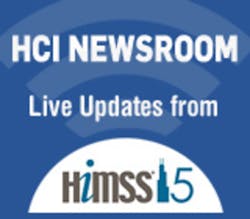St. Joseph Hospital, a Nashua, N.H. facility that’s part of Covenant Health, a Tewksbury, Mass.-based Catholic health system, had a less than enjoyable experience with its first foray into population health management.
“We’ve had financial incentives for quality for some time but the first real journey into risk was with the [Medicare] Pioneer ACO. We started with a Pioneer ACO, joined the Dartmouth-Hitchcock Pioneer ACO in January 2014. It’s been a learning experience but a costly one,” said Rich Boehler, M.D. President and CEO of St. Joseph Hospital.
Specifically, Dr. Boehler said the organization lost half a million in the ACO. There were major gaps in the data, and trying to act on that was “like trying to land a plane in the dark,” he noted in an interview with Healthcare Informatics at the 2015 Healthcare Information and Management Systems Society (HIMSS) Conference in Chicago. When they had the data, St. Joseph was able to make improvements in quality, it just didn’t become available to them all of the time.
Despite this experience and having to drop out of the Pioneer ACO, St. Joseph learned from it and moved on. It was an expensive learning experience, Boehler joked, but one that allowed them to progress down the path of population health management.
“We refined our medical home model and the wholesale deployment of care coordination, which has been the most significant change for us. The care coordinators in practices linked with the hospital, the ability to proactively manage care has been good,” said Boehler.
The organization has also deployed an analytics software platform that has allowed them to manage populations for its employees (Covenant itself is an employer with its own health plan) using claims data. They’re also hoping to get more risk-based contracts set up with other payers in New Hampshire, Boehler said.
The organization has established a centralized data warehouse (using a population health platform from the Emeryville, Calif.–based Medeanalytics) that spits out adjudicated claims data which helps it report on quality, risk stratification, and utilization rates for its employes. This process has simplified reporting under the Physician Quality Report System (PQRS) requirements and for administrative leaders like Boehler, exposed them to patients who are in the emerging risk category. It also will save the organization $1.8 million in costs for 2015, according to projections.
Moreover, in a short time period, using the analytics has already helped St. Joseph Hospital improve on quality metrics, Boehler added. The organization identified people who are at risk for developing kidney failure and who should be diagnosed for depression.
“I found it interesting that depression is among the top three diagnoses. It’s diabetes, hypercholesterolemia, and depression. About 11 percent of our employees screen positive for depression. These are people we wouldn't have normally known. We’re doing a depression screening on every employee and are able to intervene in a variety of ways. We think that will have a beneficial impact as well. It’s a very effective tool to identify at risk,” Boehler said.
Like others who have gone down this path, St. Joseph and Covenant understand this is change driven by culture, not just technology. The care coordinators—mentioned earlier by Boehler—are a team of nurses that help primary care physicians manage the care of their population. The work done by these coordinators is so revered by physicians that the organization’s CMO, Boehler said, called what they do “inspirational.”
“It’s a nice partnership between care coordinators and the docs. They’re identifying the gaps in care and these at-risk patients and working with the physician to intervene,” Boehler said. “It’s team work.”
For others that wish to go down the path of population health management, Boehler said that having this data takes these efforts to a whole new level. “It helps you discover where your losses are and what you can do to mitigate those losses. And there is no better way to influence outcomes,” he said. “You don’t know what your problems are until have the data.”


